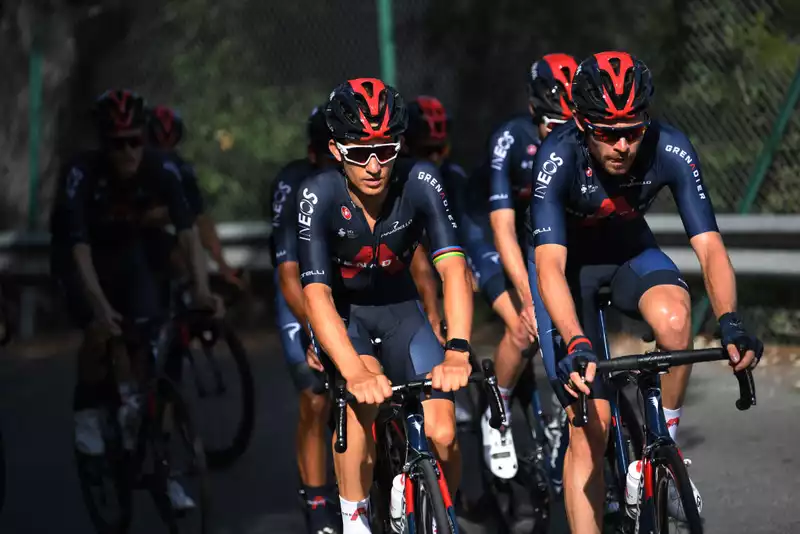As Egan Bernal sprinted to third place in the first stage of the Criterium du Dauphiné, one rider watched him take off. The young Colombian rider tried to match Jumbo Visma on the slopes of the Col de Porte. And when Bernal left the race, the same rider spent the day in a breakaway group, trying to win a mountain stage despite not being a pure climber.
Michał Kwiatkowski came to the Tour de France in good form to start his fourth Grand Boucle with the British team. Together with Luke Rowe and Jonathan Castroviejo, they form a unit of multi-skilled operators whose only job is to keep the team leader out of trouble and in the best position possible.
With Chris Froome and Geraint Thomas out of Ineos Grenadiers this year, the trio will have to coordinate with the new additions to the team: Andrei Amador, Richard Karapas, and Pavel Sivakov. Both the Ecuadorian and the Russian were making their debuts in this race and both crashed on the slippery surface of the first stage.
"It's hard to say if this will be a problem. I don't think so," Kwiatkowski replied when asked about cooperation among the eight.
"This is a new situation for all of us, but this year is full of such situations and we are tackling it as a new challenge to be tackled. We need to be very open and honest about what we say and what we expect from the team. We need to think about that. It's hard to expect the team to be in complete agreement right away.
"At the end of the day, the most important thing is that each of us came here as a team to try to get to the top of the podium in Paris. Each rider is ready to sacrifice himself for the overall win. I think this is the best way to do it. I'm one of the guys who will be in charge of all of this workout for the next three weeks. I think I will."
Ineos Grenadiers is backing defending champion Egan Bernal to lead the three-week race. However, he still feels pain in his back. He retired from the Criterium du Dauphiné this past August to focus on his recovery, but said at a pre-race press conference, "I want to try to recover, especially during the last week."
Kwiatkowski did not address Bernal's readiness, but noted that just because there is one leader does not preclude him from engaging in tactical battles and using others who already have the pedigree to shine in the three weeks of racing.
2019 Giro d'Italia winner Richard Karapas was a late addition to the team, but Kwiatkowski also spoke about Pavel Sivakov.
"Let's not forget that Richard Karapas won the Giro and that Pavel Sivakov is in incredible form this year, as he has already shown at the Criterium du Dauphiné... Riding for one leader does not mean not working with others. It doesn't mean that you don't work with others. It also means that there won't be as much pressure on Egan," Kwiatkowski said.
"This is a tool and Egan can play well tactically in a final with Pavel and Richard. From where I'm sitting, it's not that different from previous years. It is easier to play with multiple cards. Therefore, Egan will have strong support."
Kwiatkowski sees stages 17, 18, and the final time trial to La Planche des Belle Filles as the defining days of the race, but is well aware that a lot of effort will be needed to stay upright during the first few days.
"We are here to win again, so we will adapt to the situation, to the other riders, and to who we feel is strong enough, who will not lose time in the first week and who can improve their times in the second and third weeks. You can't win the Tour in the first week, but you can lose it there.
Looking ahead, Kwiatkowski expected the overall standings to already be largely shaped by the first rest day on Monday, given the hilly first week.
He also did not insert an "if" or ponder a scenario in which the race would end early due to the COVID-19 pandemic.
"In our minds, the race is headed to Paris.
"There is no plan B, and in my view, and that of my colleagues, the winner of the Tour de France is the winner after 21 stages. Even in the first week, it's hard to believe that you can be a winner of the Tour after just two, three, or four stages."
.

Comments